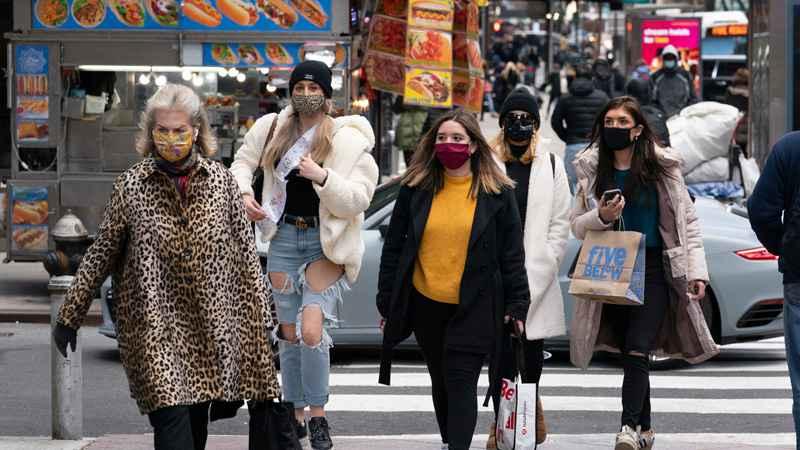Survey: Business economists foresee best growth in 37 years

FILE - Women carry shopping bags, Thursday, Dec. 10, 2020, in New York. The nation's business economists have grown much more optimistic about the U.S. economy this year.[AP Photo/Mark Lennihan]
The nation’s business economists have grown much more optimistic about the U.S. economy this year, with a majority predicting that increased vaccinations, stronger job gains and further government aid will accelerate growth to its fastest pace in nearly four decades.
A survey being released Monday by the National Association for Business Economics found that its panel expects the economy to expand 6.5% this year. That would be the sharpest such increase since 1984, when the nation was also emerging from a deep recession.
The NABE’s findings, based on the responses of 49 forecasters earlier this month, sketched a far brighter picture of the economy than its previous such survey, released in March, did. In that survey, the economists had collectively envisioned growth of just 4.8% this year.
The economy has been showing surprising strength and resilience in its recovery from the devastating pandemic recession, the worst since the Great Depression of the 1930s. Significant government aid is widely credited as a key factor. Last year, Congress approved $4 trillion in support measures after the recession, which had cost tens of millions of jobs. And in March, President Joe Biden pushed through $1.9 trillion in additional support this year, a package that included $1,400 payments to most individuals.
With viral cases dwindling, consumers increasing spending and more businesses reopening and hiring, economists have been upgrading their forecasts. The NABE panel expects the economy, as measured by the gross domestic product, to grow at an 8.5% annual rate in the current April-June quarter, up sharply from a 5.2% forecast in March. The government has estimated that the economy grew at a 6.4% annual rate in the January-March quarter, a figure that it will likely revise up in a report to be released Thursday.
As the economic recovery strengthens, concerns have been growing about rising inflation pressures. Last month, consumer prices surged by the largest amount in a decade. The NABE’s respondents expect inflation of 2.8% this year and 2.3% next year. Last year, inflation amounted to just 1.2%.
But Holly Wade, chair of the NABE’s survey committee, noted that the forecasters believe that any acceleration in inflation will be short-lived.
“Inflation expectations moved up significantly from those in the March survey, but panelists anticipate inflation easing in the second half of 2021,” Wade said.
More than half the panelists — 56% — believe the economy’s balance of risks are tilted to the positive side. with the government’s spending aid programs and proposed infrastructure measures now pending in Congress seen as likely drivers of growth.
More than one-third of the survey panel — 35% — identified vaccine-resistant variants of COVID-19 as the biggest risk to their upgraded economic forecast. That factor was followed by worries about a slowdown in the number of people willing to be vaccinated and concerns about stock market volatility.
Though the number of jobs that employers added last month slowed to 266,000, far below expectations, the NABE panel was optimistic about further strong job gains. Many economists have attributed April’s hiring slowdown, in large part, to a shortage of job applicants in some industries.
Two-thirds of the panel expects payroll jobs to regain their pre-pandemic levels by next year, with the most optimistic believing it could occur by the end of this year. In the March survey, 59% had estimated that pre-pandemic job levels wouldn’t be achieved until 2023 or even later.